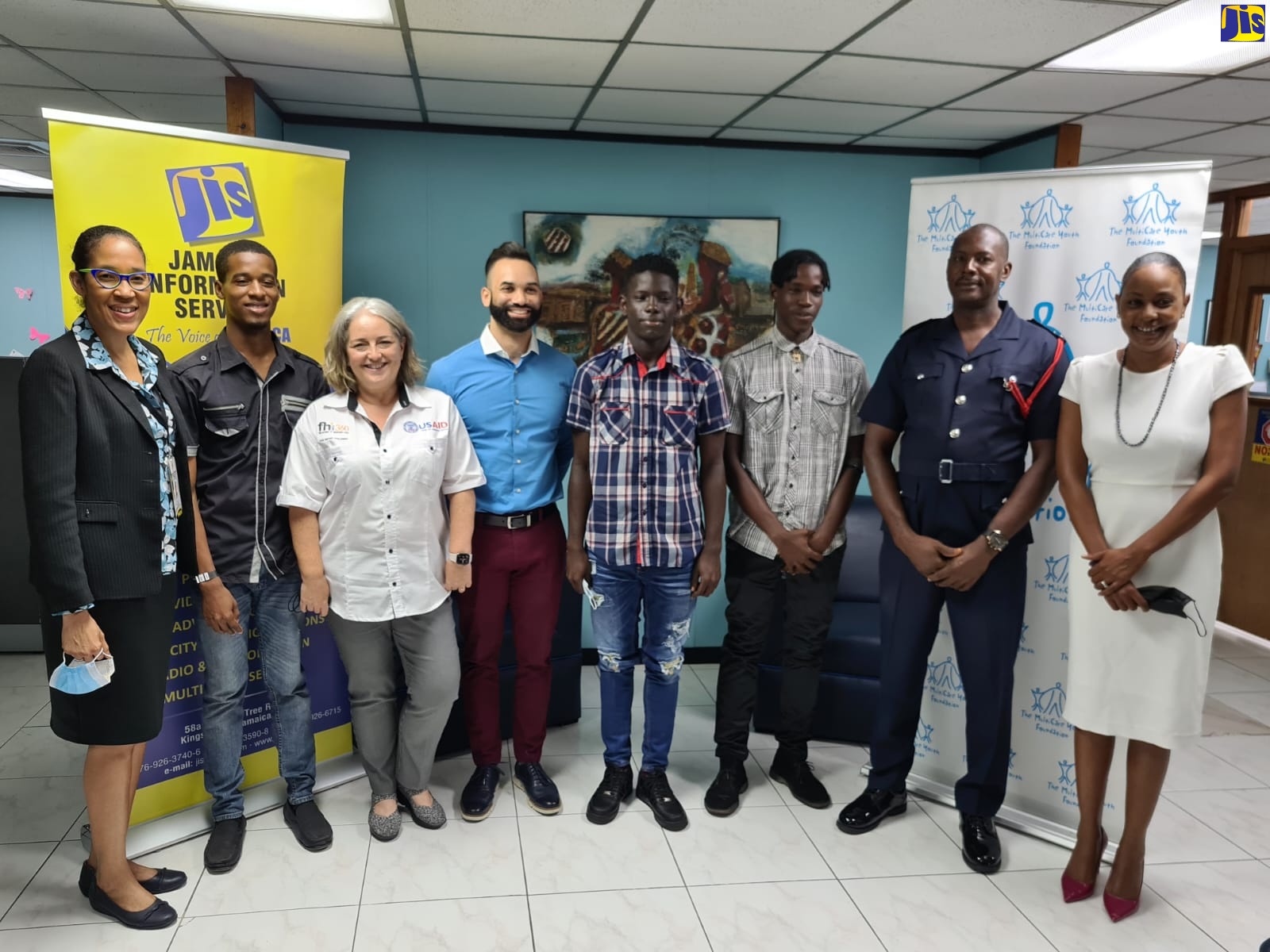YUTE For Tomorrow Making A Positive Impact
By: , March 31, 2022The Full Story
Representatives of FHI360 and the MultiCare Youth Foundation (MYF) are celebrating the success of the YUTE for Tomorrow programme and the impact it has been having on the lives of the participants.
The initiative provides critical interventions for 100 young people, aged 15 to 29, from various communities, who are considered to be at medium and high risk for crime and violence. The interventions include life skills training, mentorship, internship for job opportunities, as well as some vocational skills referrals.
The primary communities targeted are Whitfield Town and Trench Town in Kingston, as well as Flanker, Salt Spring and Green Pond in St. James.
“One of the most fulfilling things is to see the changes that happen in the lives of the young people who are impacted by our programmes,” Executive Director of the MYF, Alicia Glasgow Gentles, tells JIS News.
“Our life skills and social skills programmes are really designed to get the young people to change their mindset. A lot of them come from communities where the culture is really what they follow. We are empowering them to become leaders of their own lives by providing this level of support to them,” she says.
YUTE for Tomorrow is financed through a Local Partner Development project initiated by the FHI360, which is an international non-profit organisation that seeks to address development issues, primarily related to health, as well as social problems such as crime and violence.
The funding was made possible via the United States Agency for International Development (USAID) under the Caribbean Basin Security Initiative for youth crime prevention.
The psychosocial support and life skills training provided under YUTE for Tomorrow, are geared at making young people employable and able to join the productive workforce.
“Our youth model is really life skills, mentorship, internship placement and vocational skills training. We know that these are some of the areas that young people need to be upskilled in, to become those productive citizens,” Mrs. Glasgow Gentles tells JIS News.
The HEART/NSTA Trust is a programme partner, and young people are allowed to enrol at that the institution in a skill area of their choice.
The life skills component of the programme is captured under the Passport to Success (PTS) programme. Developed by the International Youth Foundation, PTS allows for the training of trainers in institutions such as schools and the correctional services.
“Probational officers, as well as correctional officers, were trained in the curriculum to be able to deliver to the youth in their centres, in their schools, which allows for greater sustainability and reach. So more young people are being reached because we have this train-the-trainer model,” Mrs. Glasgow Gentles explains.
The PTS is steered by a hundred-model curriculum that looks at various areas, including health, which aims to encourage young people to either stay in school or successfully enter the workforce.
“The PTS looks at life and employability skills, so there may be things like communication, decision-making, problem-solving as well as dress and deportment, respect for self and others, respect for authority, time and money management,” Mrs. Gentles points out.
The MultiCare Youth Foundation head says that the programme is making an impact, noting that residents are taking notice of the positive changes being displayed by the young beneficiaries.
“There are lots of young people who benefit from the programme, and they may not necessarily go inside the community and share with others. But just their presence, when they walk in their communities… leaving for work and… then they begin to earn, and you see the changes in their families’ lifestyle. That itself impacts the community and the people around them, who enquire about how they got into this programme,” Mrs. Glasgow Gentles shares.
But there are participants who are happy to share their experience in the programme with others.
Among them is Jermaine Weir, who tells JIS News that he has gained something positive from the programme and believes that others can also benefit.
“It teaches me certain things so that when I go into the community, I show the younger ones what we learn. Mi reason with them and tell them to go to school, take up the book, keep focused and don’t follow bad company,” Jermaine shares.
The young man, who interned at the Jamaica Fire Brigade, tells JIS News that it was a great learning experience, and that he was able to adapt well to the work environment.
Another participant, Ameer Johnson, whose internship took him to the Jamaica Information Service (JIS) for a period of three weeks, has high hopes for a positive future. He recalls many expressions of commendation extended to him while at the agency.
“They said I am a good youth, and I can really work. They said I am punctual. I feel nice… . It shows me that I can get to my goals and can [earn] money to help my family,” Ameer shares with JIS News.

Ameer is receiving high marks from Human Resources Director of the JIS, David Knight, who describes the youngster as a “promising, ambitious young man, who was always punctual, quick-learning and personable”.
Speaking about his plans, Ameer shares that he has his sights set on going into the army and owning a fleet of trucks to do delivery.
A critical area of YUTE for Tomorrow is youth crime and violence prevention through capacity-building of organisations, as well as direct interventions with the youngsters.
Youth Crime and Violence Prevention Specialist, Local Partner Development, FHI360, Machel Stewart, tells JIS News that the measures involve partnerships with civil society organisations (CSOs), the Government of Jamaica, as well as the private sector.
“Positive youth development is a main tenet of the activity and what we want to see, at the end of the day, are youth being less likely to be involved in crime and violence. So, we are targeting youth at high and medium risk in the general population, and so we have programmes that are tailored for their own specific risk factors,” he notes.
He points out that the programme targets both males and females. However, “based on the risk profile we will end up with mostly males”.
It utilises a youth targeting tool, developed by the Ministry of National Security under the Citizen Security and Justice Programme, that allows for the identification of young people who are at high, medium, or low risk of involvement in crime and violence.
Through partner entities, including the MultiCare Foundation, FHI360 is also working with schools and directly with the Ministry of Education and Youth, particularly guidance counsellors.
Mr. Stewart notes the importance and timeliness of the school intervention given the impact of the prolonged period of absence of students from the classroom due to the coronavirus (COVID-19).
“The implication of schools not being open is that you have youth who have been out of school for a while [associating] with persons who are not necessarily the most positive influence, and they have carried a lot of this antisocial behaviour back to school.
“And so, what we are looking to do is helping… the deans of discipline and giving them the capacity to identify those persons and what the risk levels are, and then develop the treatment plans to deal with them specifically,” Mr. Stewart points out.
The MultiCare Youth Foundation head, Mrs. Glasgow Gentles, is reiterating the organisation’s commitment to empowering young people across Jamaica.
She says that the objective is to steer them away “from a life of crime and violence and, in turn, take up opportunities that will allow them to not only grow psychologically but also in terms of their social and economic factors that will allow them to become productive citizens of Jamaica.
“One of things we know is that… they want better, so our role is to help them achieve their goals,” Mrs. Glasgow Gentles says.




